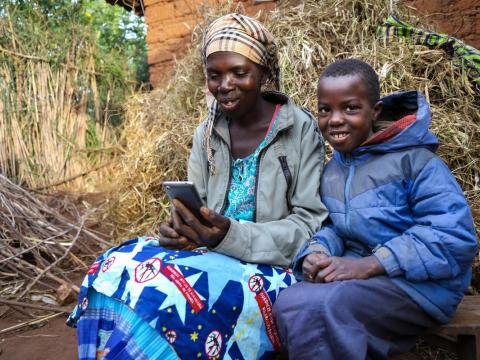Digital technology increases community empowerment and programme efficiency in Rwanda

By David Zvipore, Senior Technical Advisor, Global Livelihoods
Inspired by the possibilities of digitisation, World Vision Rwanda (WVR) piloted a new learning initiative in 2020 to test several digital tools on World Vision’s Ultra-Poor Graduation (UPG) programming model.
Using technology from Kobo Collect, Last Mile Mobile Solutions (LMMS) and Power BI, the Rwandan team captured several lessons learnt about this initiative. With the collaboration of 816 volunteers, they monitored an average of about 61 households each to collect both project and demographic data to enhance the UPG project monitoring system into a centralised dashboard
“This was a wonderful learning opportunity for learning for WVR, but also other partners and practitioners interested in this area of work,” says Aimable Nsengiyumva, Resilience and Livelihoods Technical Programme Manager for World Vision Rwanda. “One of the other encouraging findings has been that mobile data collection during implementation of Ultra-Poor-Graduation projects has enhanced data accuracy and quality of reporting.”
The team noted its first major observation during the digital monitoring system design phase that emphasised the value of working together with varied partners (from local regional and global areas) who were able to focus their depths of technical expertise on child well-being and other key aspects of the project model. This created diverse and unique opportunities for co-creation and co-learning within the field context and proved to be useful in meeting demand for the required capacity and bandwidth required for this innovative learning project.
Secondly, during the project participant registration and system onboarding, the team recognised the importance of capacity building for field-facing staff. Since household data had to be collected digitally, WVR had to recruit coaches with the necessary skills and include an intensive training package for coaches within the programme design. During this training, learning by doing was key and included practical sessions, mock trials and pilot runs in the training schedule. This practical training was also effective in addressing literacy issues across a wider demographic of volunteers.
Overall, World Vision Rwanda found the digital data collection to be an empowering process, especially where the digital knowledge, skills, and means were transferred to the community. The participants also found the data collection process to be more transparent because they could see the answers that were being inserted in the digital devices together with the coach.
Also of note, World Vision Rwanda’s combined use of mobile data collection and dashboards as a monitoring solution enhanced the simplicity and efficiency of their reporting system to track the progress of the graduation project. The project field staff have reported how they previously used to estimate training coverage without actual records on exactly who the people were that had been trained or monitored. Furthermore, the mobile system has reduced the time field staff spend visiting each household and enabling them to reach more households per day. The dashboard system has aided in helping to compare the monitoring of partners and helping World Vision management to better coordinate well in workload with partners.
In terms of areas of continuous improvement, relevant managers are using the system, but the accuracy of the data is still limited because monthly submissions are not yet at 100% completion. Also, as the system is only four months old, some community workers are still struggling to visit all households in their respective communities each month. Previously, the team reported that generating indicator-based reports for monthly and quarterly monitoring has been very difficult of late, with programme managers having to go to the field each time they needed data for reporting. With the introduction of the new digital technology, however, WVR staff have confirmed that they no longer need to waste resources and time looking for reporting data, but simply get it from the dashboard system.
You can find a final report outlining the use of the Last Mile Mobile Solutions and Power BI Dashboards for Monitoring and Evaluation of the Ultra Poor Graduation Project Models as well as lessons learned here.
Lessons from World Vision Rwanda
By all merits, it is therefore advisable to have mobile applications in the monitoring and evaluation of UPG programmes for quality programme delivery. The learning initiative also indicates a positive contribution to greater impact in community participation and empowerment, and programme outcomes overall.
For more information, please contact:
Colin, Dyer, Livelihoods Technical Director for Quality & Innovation (colin_dyer@wvi.org )
David Zvipore, Senior Technical Advisor, TSO Livelihoods (david_zvipore@wvi.org ), and
Aimable Nsenginyumva, Resilience and Livelihoods Technical Programme Manager, WV Rwanda (aimable_nsenginyumva@wvi.org ).